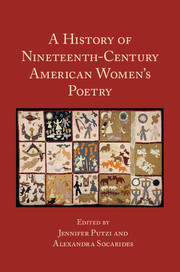Book contents
- Frontmatter
- Contents
- List of Illustrations
- List of Contributors
- Acknowledgments
- Introduction: Making History: Thinking about Nineteenth-Century American Women's Poetry
- PART I 1800–1840, AMERICAN POESIS AND THE NATIONAL IMAGINARY
- 1 Claiming Lucy Terry Prince: Literary History and the Problem of Early African American Women Poets
- 2 Before the Poetess: Women's Poetry in the Early Republic
- 3 The Passion for Poetry in Lydia Sigourney and Elizabeth Oakes Smith
- 4 Album Verse and the Poetics of Scribal Circulation
- 5 Presents of Mind: Lydia Sigourney, Gift Book Culture, and the Commodification of Poetry
- 6 The Friendship Elegy
- 7 Gendered Atlantic: Lydia Sigourney and Felicia Hemans
- PART II 1840–1865, UNIONS AND DISUNIONS
- PART III 1865–1900, EXPERIMENT AND EXPANSION
- Suggested Further Reading
- Index
1 - Claiming Lucy Terry Prince: Literary History and the Problem of Early African American Women Poets
from PART I - 1800–1840, AMERICAN POESIS AND THE NATIONAL IMAGINARY
Published online by Cambridge University Press: 21 January 2017
- Frontmatter
- Contents
- List of Illustrations
- List of Contributors
- Acknowledgments
- Introduction: Making History: Thinking about Nineteenth-Century American Women's Poetry
- PART I 1800–1840, AMERICAN POESIS AND THE NATIONAL IMAGINARY
- 1 Claiming Lucy Terry Prince: Literary History and the Problem of Early African American Women Poets
- 2 Before the Poetess: Women's Poetry in the Early Republic
- 3 The Passion for Poetry in Lydia Sigourney and Elizabeth Oakes Smith
- 4 Album Verse and the Poetics of Scribal Circulation
- 5 Presents of Mind: Lydia Sigourney, Gift Book Culture, and the Commodification of Poetry
- 6 The Friendship Elegy
- 7 Gendered Atlantic: Lydia Sigourney and Felicia Hemans
- PART II 1840–1865, UNIONS AND DISUNIONS
- PART III 1865–1900, EXPERIMENT AND EXPANSION
- Suggested Further Reading
- Index
Summary
Of the millions of women who were stolen from Africa and sold into slavery in British colonial America, only two are remembered as poets: Lucy Terry Prince, who lived between about 1729 and 1821, and her much younger contemporary, Phillis Wheatley, who lived between about 1753 and 1784. So many names lost. So few found. Prince and Wheatley beat the odds by being remembered at all; yet, they have posed an ongoing challenge to the project of tracing an African American literary tradition. Literary history, like any history, emphasizes consequence, narrative coherence, and affiliation. It yearns for beginnings, middles, ends or, at least, a series of “begats” tracing a lineage that helps us know who we are. Prince and Wheatley would seem to offer a clear starting point to the story of African American literature and, particularly, to the study of African American women's literature. Both were abducted from Africa, both enslaved in British New England, both committed to the American Revolution and to evangelical Protestant Christianity. Both achieved manumission, married, and became mothers. Both were famous in their own times as poets. Yet, Prince's vernacular ballad recounting an event from the 1740s couldn't seem more different than the sophisticated, neo-classical poetry published by Wheatley in the 1760s and 1970s: affiliations between their poetic practices aren't that obvious. Nor has it been easy to find clear lines of influence between the poetry of either woman and that of the African American women poets who consciously attempted to forge a tradition in the aftermath of slavery. It shouldn't be that much of a surprise, then, that American literary history has had a hard time accommodating Wheatley and, to a greater extent, Prince.
The problem undoubtedly has to do with what April Langley calls the “dysfunctional relationship between Western- and African-centered theories” of black American and, generally, eighteenth-century aesthetics. It also has to do, as Vincent Carretta and John Shields have suggested, with the tendency for Americanists to approach eighteenth-century black authors from the vantage point of a present that assumes the existence of social formations, such as that of an American or African American national identity, that had not yet come into being.
- Type
- Chapter
- Information
- A History of Nineteenth-Century American Women's Poetry , pp. 17 - 36Publisher: Cambridge University PressPrint publication year: 2016



